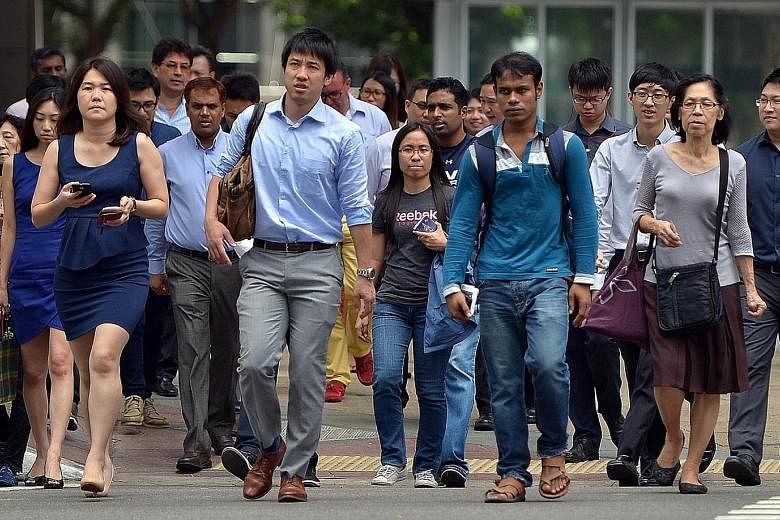Millennials here expect to retire by 60 despite knowing that they will need to support themselves longer, says a new poll.
This is according to HSBC's Singapore report on The Future of Retirement series, Shifting Sands.
It found that most of those aged between 20 and 37 expect to quit working at 60, two years less than the overall average of those surveyed in 16 nations.
By contrast, local baby boomers - those between 52 and 72 - have far more conservative expectations, with many saying 67 is their likely retirement age.
Only 16 per cent of millennials here expect to continue working after 65 - even as their generation faces unprecedented financial pressures while state retirement ages continue to rise around the world.
This is despite 64 per cent of Singapore millennials acknowledging that they will need to support themselves for longer than previous generations.
THE PERFECT STORM
Millennials here are seen as having the worst retirement prospects of any generation. They entered the workforce during subdued economic conditions and will be required to financially support an increasing number of older non-working dependants over the remainder of their working lives.
-
Four steps to retiring well
-
HSBC's research identified four actions to enhance financial well-being in retirement:
1. BE REALISTIC ABOUT YOUR RETIREMENT
Make sure you are well prepared for a long and comfortable retirement by starting to save earlier and more. Factor potential healthcare costs into your retirement planning.
2. CONSIDER DIFFERENT SOURCES OF FUNDING
Balance your ways of saving and investing for retirement to spread the risk and maximise the returns. Be realistic about your expected returns.
3. PLAN FOR THE UNEXPECTED
Unexpected events can have a major impact on retirement funding. Include worst-case scenarios and consider putting protection in place to help secure your retirement income.
4. TAKE ADVANTAGE OF TECHNOLOGY
Embrace new technology to make planning for your retirement easier. Online planning tools can help you understand your retirement funding needs and track progress towards your goals. Seek professional financial advice if you need help.
The HSBC report found that only 8 per cent of those surveyed in Singapore think millennials are in the best position to have a comfortable retirement, while 45 per cent see baby boomers as best placed.
Moreover, 50 per cent believe Singapore millennials have experienced weaker economic growth than previous generations, while 44 per cent agree that this group is paying for the economic consequences of older generations, such as the global financial crisis and rising national debt.
In particular, Singapore's rapidly ageing population means that by 2024, the nation will join 33 others as a "super aged" nation, where one in five people is 65 or older.
According to Population.Sg, an online initiative by the National Population and Talent Division, it has taken Singapore only 19 years from 1998 to transition from an ageing to an aged society. Hence, the burden of supporting the economy will inevitably fall on millennials.
NOT ALL BLEAK NEWS
Despite these headwinds, the picture is not entirely bleak, says the HSBC report, which polled 18,000 people in 16 countries, including 1,007 here.
It noted that 61 per cent of those surveyed in Singapore believe millennials enjoy a better quality of life than previous generations, and 68 per cent believe this cohort will have more flexibility in retirement, including the option to semi-retire, allowing them to continue supporting themselves.
Mr Anurag Mathur, head of retail banking and wealth management at HSBC Singapore, says: "While Singapore millennials are broadly aware of the economic and demographic challenges they face, they do not appear to have grasped the full implications of their retirement.
"With low interest rates, rising healthcare costs and potentially declining social provisions for retirees in the future, it has never been more important to save for a comfortable retirement.
"Starting to save early - and saving enough - can reduce the need to continue working in later life."
MEETING THE CHALLENGE
Notwithstanding the apparent reality gap in retirement expectations, most millennials here have started to plan for their retirement, unlike their global peers, where 29 per cent have yet to begin.
The report noted that 75 per cent of Singapore millennials have begun saving for retirement, starting at an average age of 27.
While 65 per cent say they have cut back on expenses, 55 per cent actively seek information to guide their financial decisions.
About 45 per cent of respondents actively move money around to get the best returns.
Singapore millennials are also more likely than other generations to take investment risks to boost their retirement savings, with 31 per cent being very willing to make risky investments, compared with 26 per cent of Generation X - those aged between 38 and 51 - and 27 per cent of baby boomers.
This is also consistent with their greater number of years to retirement. However, when compared with their global peers, Singaporean millennials have a lower risk appetite when it comes to investing.
Mr Mathur adds: "In the past, it may have been enough for Singaporeans to depend on cash savings and property to generate retirement income.
"Now, with the prolonged low-interest-rate environment and the introduction of property cooling measures, it is important to take a more active and diversified approach when it comes to investing."


